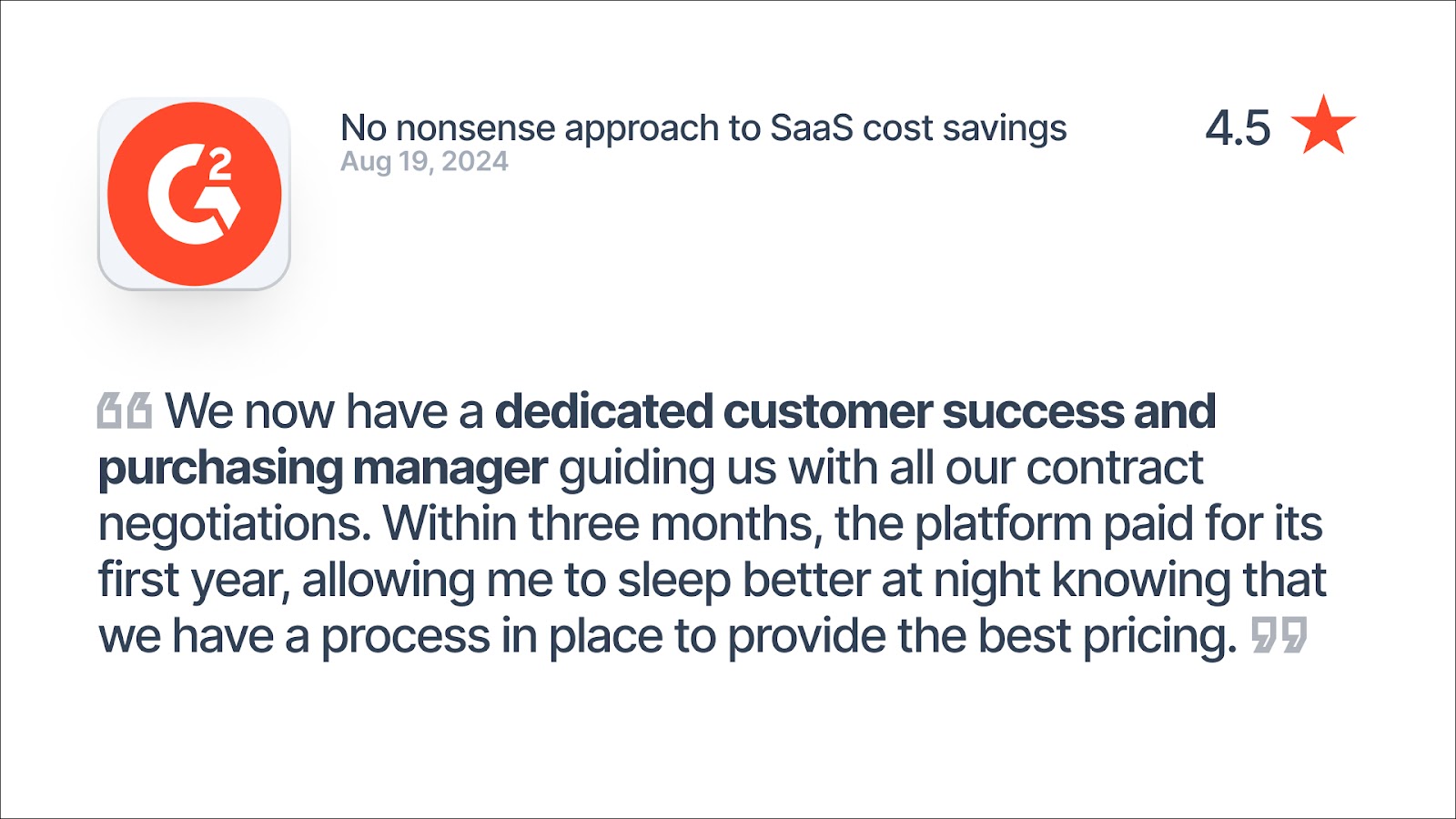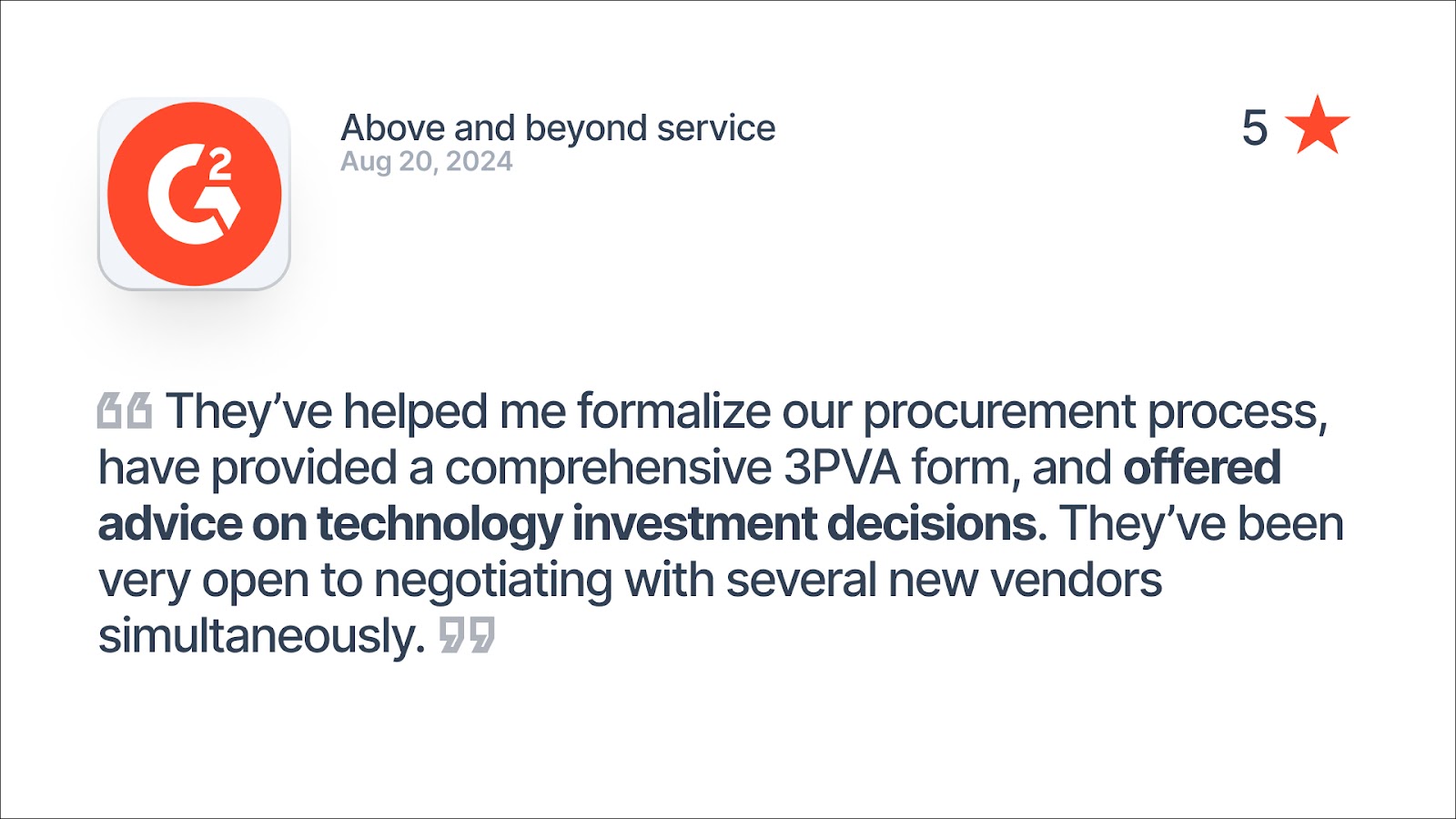Why experience in SaaS negotiations is vital

Take a self-guided tour of the platform.
See why Vertice is trusted by top procurement leaders.
SaaS negotiations are hard. As a procurement partner you have to juggle:
- The demands and expectations of the customer, such as balancing the need to ensure an effective and detailed negotiation without a protracted process.
- Pressure from vendors who have their own agendas, whether simple price and profit, or contract length, or even the adoption of certain features.
- To provide the best discounts and contract features for the customer, whilst maintaining a healthy relationship with every vendor.
There are so many moving parts and plates to keep spinning, it feels like a daunting, no-win, proposition. At least, that’s what it may seem to someone new to the role.
And so when a procurement partner entrusts this to junior, less experienced buyers, customers will often receive a confused, inefficient and ultimately poor level of service.
Some may try to get round this by ‘sharing’ the load between experience and inexperience, but using multiple purchasing managers for a single project also results in the same problem - longer, inefficient contract cycles with inadequate outcomes.
At Vertice, we encounter stories like this from new customers all the time. Slow, clumsy negotiation processes; contracts that seem to favor the vendors; and ultimately savings promises that are not realized.
Here’s what a few of our recent new customers had to say…
“Multiple points of contact meant that I never truly understood what was going on - and they didn’t understand my business.”
You may think that having many purchasing managers working on your project means you are likely to get better results, given the additional eyes and brains involved.
This tends not to be the case. It creates a stunted, unclear process where your project is passed around, particularly amongst junior buyers. So you’re never really sure who is doing what, and what is being achieved - and everything simply takes longer.
It is also easier for a customer to brief one experienced procurement expert and have them act for you and in your interests. Not only in terms of your financial objectives, but also ensuring that the contract matches your strategy, corporate ambitions and expected needs. These nuances are almost impossible to communicate across a wide, fragmented, transient team, so before you know it, contracts are being taken in the wrong direction by a junior buyer whose negotiations are focusing on the wrong things.
And trust is lost.

“I received recommendations for tools that didn’t fit my remit”
Matching the customer’s needs to the capabilities and pros and cons of the multitude of options for every sort of SaaS tool is an art.
It requires an in-depth knowledge of the marketplace, common features and technical abilities of tools, and a clear understanding of your current issues and ideal growth pathway.
If your procurement partner's buyer team lacks such experience, they will struggle to put the pieces of this puzzle together for you - devaluing the advice they can give you.

“We were caught out by contracts that hadn’t been checked properly”
As a procurement partner, negotiating with SaaS vendors is a tightrope. Your primary goal is to get the best deal for your customer, but to do so without affecting a solid (but still impartial) relationship with a vendor so you can continue to negotiate with them effectively in the future.
The best procurement partners will have three core traits:
- Skill - The ability to negotiate on good terms with vendors without compromising your ultimate goal of getting the best priced, best-fit contract for your customer.
- Diligence - Doing the research and going through details with a fine tooth-comb. It’s about knowing that the way the tool is likely to be used, or how the company may evolve during the contract term, is not going to trigger any additional charges or clauses (e.g. automatic price increases when usage limits are hit, or activating new features renewing the contract term).
- Knowledge - Knowing the needs and expectations of your customer. It’s about getting them the best deal for that software type in the market rather than for a specific vendor. If they can’t offer it, then be prepared to move to an equivalent platform elsewhere, which requires knowing who the other vendors in the space are and what they offer
Skill, diligence and knowledge come with experience. Without these three you’re entering negotiations without leverage, which means contracts are destined to not meet the customer’s financial and business requirements.
See how FMG turned to Vertice to fix problems that had arisen from a third-party procurement partner that did not properly check and evaluate contracts.
Expert buyers means better negotiation outcomes.
- Years of negotiating experience means they know exactly what levers to apply with vendors.
- A dedicated and focused approach to negotiation, with diligent and in-depth market research, driven by data and industry knowledge.
- They know the importance of clear, constant and constructive communication. And that means being the only one handling your contract.
- They can balance the expectations of a customer and the relationship with a prospective vendor to carve out the best deal terms and prices.
- They are subject matter experts across the SaaS software industry and, through collaborative working environments, share knowledge with each other. So you don’t get passed around to find the best expert for a particular need.
Vertice has expert SaaS buyers that have negotiated over 8,000 contracts for our customers. Drawn from a variety of procurement backgrounds, including KPMG, Zillow, and Accenture, their invaluable and wide-ranging experience enables us to achieve savings of up to 30% across contracts.
They work with you 1-on-1 to understand your short and long term requirements, and help recommend vendors and contract structures that fit you individually. And they’re always on hand for advice and questions, so you can build that rapport and trust with them quickly.
And they work collaboratively with each other, sharing their knowledge and expertise regularly to ensure that whilst you have a dedicated manager, you get the SaaS buying experience of an entire team of subject matter experts.
That’s the type of experience you need from a procurement partner.
.webp)


![The Best SaaS Management Platforms for 2026 [According to Analyst Research]](https://cdn.prod.website-files.com/6640cd28f51f13175e577c05/687f56f6e55f8c0078341eb6_2025-06-Lionfish-Tech-Advisors-Report-01-1080x1080.webp)


.webp)